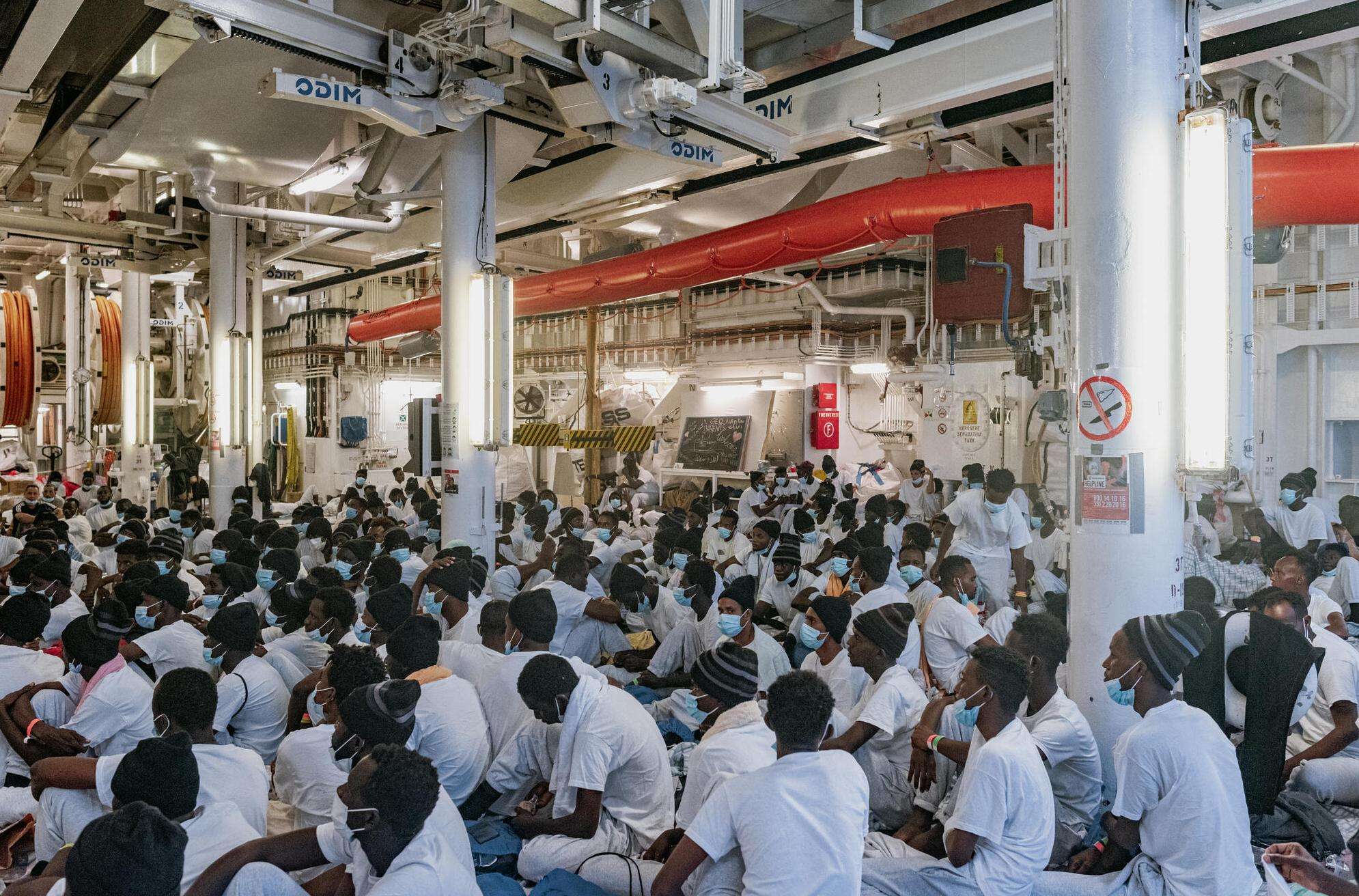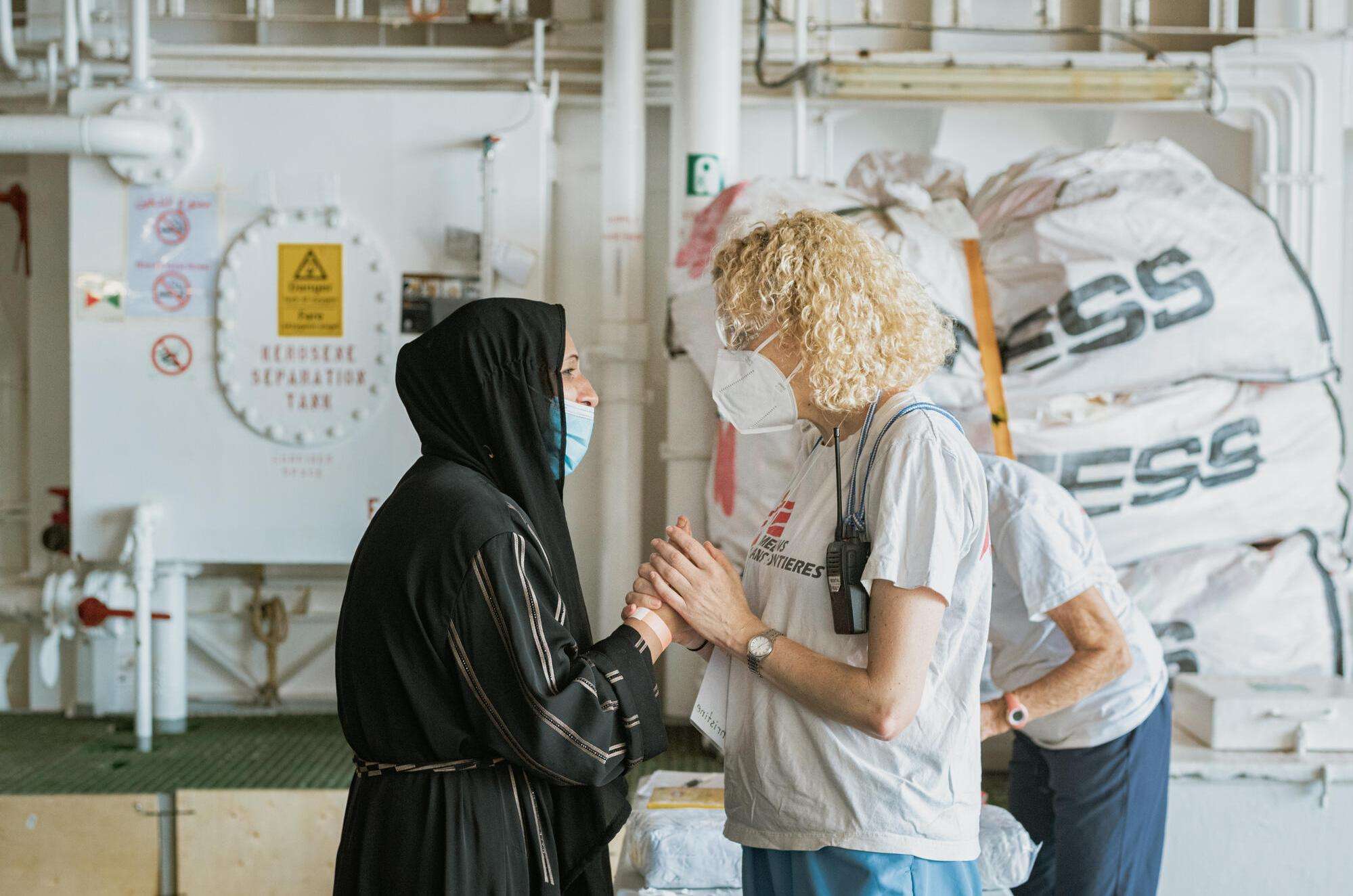Update, October 27: The Geo Barents has been assigned a port of safety. The search and rescue vessel is now making its way to disembark 367 survivors in Palermo, Italy.
After five challenging rescues amid very harsh conditions, almost 400 people were brought aboard the Geo Barents search and rescue ship in the Central Mediterranean in less than two days. Among the 367 people now on board, 172 are children—134 of whom are unaccompanied. Many of the survivors suffered from hypothermia after prolonged exposure to the elements or falling in the water, as well as seasickness, dehydration, loss of appetite, and illness from fuel inhalation. With dangerous weather looming, Doctors Without Borders/Médecins Sans Frontières (MSF) is now calling on Italy to provide a place of safety for these people without delay.
“Once again, we are witnessing how European migration control policies are endangering the lives of thousands of people by having no proactive search and rescue capacity at sea and failing to provide a response to all distress calls," said Caroline Willemen, MSF project coordinator on board the Geo Barents. "It’s unacceptable that NGOs are left to fill the deadly gap.”
On the morning of October 22, MSF's team conducted the first rescue in which thirty-six survivors were brought on board the Geo Barents from a wooden boat. At the same time, our team received a new alert: a rubber boat in distress several hours away.
“We got there at night and it was completely dark," sais Leo Southall, MSF deputy search and rescue team leader. "The waves were more [than] ten feet high at one point, and there was a lot of wind. The boat was in very fragile condition and the people on board had inhaled fuel fumes.”
After two intense hours, the team was able to get all 65 survivors on board including one person who had to be brought on by stretcher. While the survivors were relieved, many were anxious and exhausted after being at sea for more than 24 hours.

Rescued people on Geo Barents deck.
Ignored by authorities
Later that night, the Geo Barents received a third alert from another overcrowded wooden boat in distress. Although authorities were aware of the situation, no one had responded or intervened. It took our team nine hours to reach the boat, while neither authorities nor other nearby vessels assisted them.
“Imagine being on an overcrowded boat without a life vest, surrounded by waves up to ten feet high," said Willemen. "Your clothes are soaked, you are suffering from fuel inhalation and running out of food and water. Imagine calling for help and no one answers. This is the reality we are witnessing at sea.
"This is another clear example of how nearby coastal states are refusing to take any responsibility for people in distress at sea. The boat had been in dangerous waters for three days with 100 people on board, including 42 children. Leaving people to drift at sea for days is unacceptable."
Libya is not a safe place
On October 23, the Geo Barents had 201 people on board when it received a new alert of another rubber boat in distress six hours away. As MSF's team reached the area, they witnessed the Libyan Coast Guard quickly approaching the rubber boat, maneuvering dangerously around it.
Our team feared another interception—the previous day, the team had witnessed migrants and refugees on board a Libyan Coast Guard vessel next to an empty boat that was set on fire. If the Libyan Coast Guard intercepted the vessel the survivors would in all likelihood be forcibly returned to the cycle of violence and exploitation in Libya. Fortunately, MSF reached the boat first and managed to bring the 95 survivors on board.
“European States and institutions must immediately suspend their political and material support to the Libyan Coast Guard and stop the system of forced returns to Libya," said Willemen. "Libya is not a safe place.”

First medical assessment and triage of survivors of the first rescue on October 22, 2021.
A humanitarian catastrophe
On October 24, MSF's team performed a fifth critical rescue of a rubber boat in distress that was filling up with water. Seventy-one people were rescued and safely brought on board.
“The past days have illustrated the humanitarian catastrophe taking place at the southern border of Europe,” says Willeman. “With only humanitarian vessels monitoring the world’s deadliest migration route, the need for more search and rescue capacity is desperately needed."
